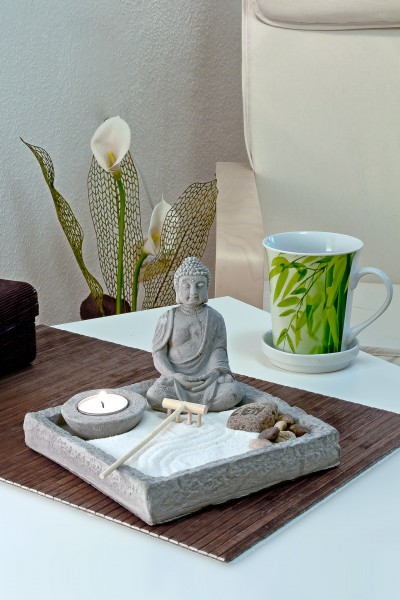Fēng Shuǐ
(Chinese for wind and water) is the Far Eastern doctrine of the harmony of man in his environment, achieved through the harmonious design of living and working spaces.
The Qi
Central to this Daoist teaching is qi, the invisible life energy that can be directed through planned intervention in the interior design and architecture of a home. The high accumulation of life energy is said to increase the health and success of the occupants.
The residential trend Death Cleaning describes a method of keeping the premises in order and sorting personal life. The naming refers to older people who want to leave a sorted environment for their descendants, but the principle is also applicable to younger people who want to make life easier for themselves.
Both philosophies are based on releasing ballast and promise a tidier, happier life. For all tidying techniques, a small reward after sorting out helps the soul to continue. The less furniture, accessories and files there are in the home or workplace, the more individual pieces come into their own.
Even with the same furnishings, tidying can create a new expression. Give away or sell furniture and accessories to friends or acquaintances who will enjoy them. From time to time you should repeat tidying, because man is a hunter-gatherer. The best, most ecological and cheapest way is to think carefully before buying, whether the item will be used in the long term and will bring pleasure.
Death Cleaning home and office - remove everything that does not make you happy.
Death Cleaning is loosely translated from "Döstädning", it is a composition of "die" and "cleanliness" according to the book by the Swedish Margareta Magnusson. The goal of this system is the release of ballast through a personal feeling of happiness. Each person in Germany owns statistically about 10,000 objects, with the tidying trend "Death Cleaning" you declutter your life yourself, so that no one else has to do it. Start with large items, like furniture and things out of sight, like attic, basement or storage. Does this desk still fit me? Isn't ergonomic office furniture more practical? Finally, come the documents and smaller and personal counterparts, including gifts and mementos. Before sorting out, each piece is examined for its value in the individual happiness barometer. If it makes you happy in the here and now, it may stay otherwise it must go. Household items such as brooms, vacuum cleaners or cleaning buckets also belong to happiness, as life would be more burdensome without them. Everything that is beautiful, but pointless, is placed in a treasure chest. macos/deepLFree.translatedWithDeepL.text

